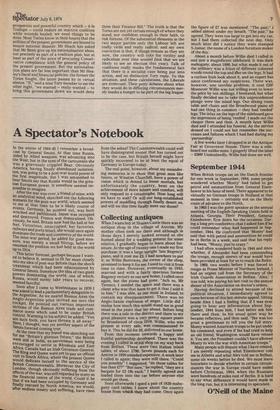September 1944
When British troops sat on the Dutch frontier for one week in September, 1944, some people wondered whether 'Monty' had failed to get petrol and ammunition from General Eisenhower in his hour of need. There appeared to be virtually no German troops in Holland at that moment in time — certainly not on the likely route of acIvance to the North. hi 1965 I was the guest speaker at the annual meeting of the English-Speaking Union held in Atlanta, Georgia. Their President, General Eisenhower, flzw down for the occasion. During a long pre-conference chat I asked him if he could remember what had happened in September, 1944. He confirmed that 'Monty' had said that with petrol and ammunition he could be in Berlin in a week, and said that his reply had been, "Monty, you're crazy." I had often wondered both in 1949 and since whether, if Alexander had been commanding the troops, enough sinews of war would have been provided at least for us to reach the Baltic. In 1969, two weeks before I was forced to resign as Prime Minister of Northern Ireland, I had an urgent call from the Secretary of the Irish Guards Association in Belfast. 'Alex,' 1 was told, was paying his last visit to the annual dinner of the Association on doctor's orders.
Having declined to attend because of the political situation, I immediately agreed to come because of this last-minute appeal. Sitting beside Alex I had a feeling that if I was ever going to hear any information about September, 1944 from him, I had better ask him there and then. In his usual quiet way he became reflective, and then said, "Ike was too great a gentleman to tell you the full story. Monty wanted American troops to be put under his command, and even if Ike had tried to help an old friend, Washington would have vetoed it. You see, the President couldn't have allowed Monty to win the war with American troops." Many people will dispute what I have related. I am merely repeating what Eisenhower told me in Atlanta and what Alex told me in Belfast, some six weeks before he died. We must leave historians to decide whether in certain circumstances the war in Europe could have ended before Christmas, 1944, when the Russians were hundreds of miles east of Berlin. It is hard to say what difference it would have made in the long run, but it is interesting to speculate.
O'Neill of the Maine


































 Previous page
Previous page